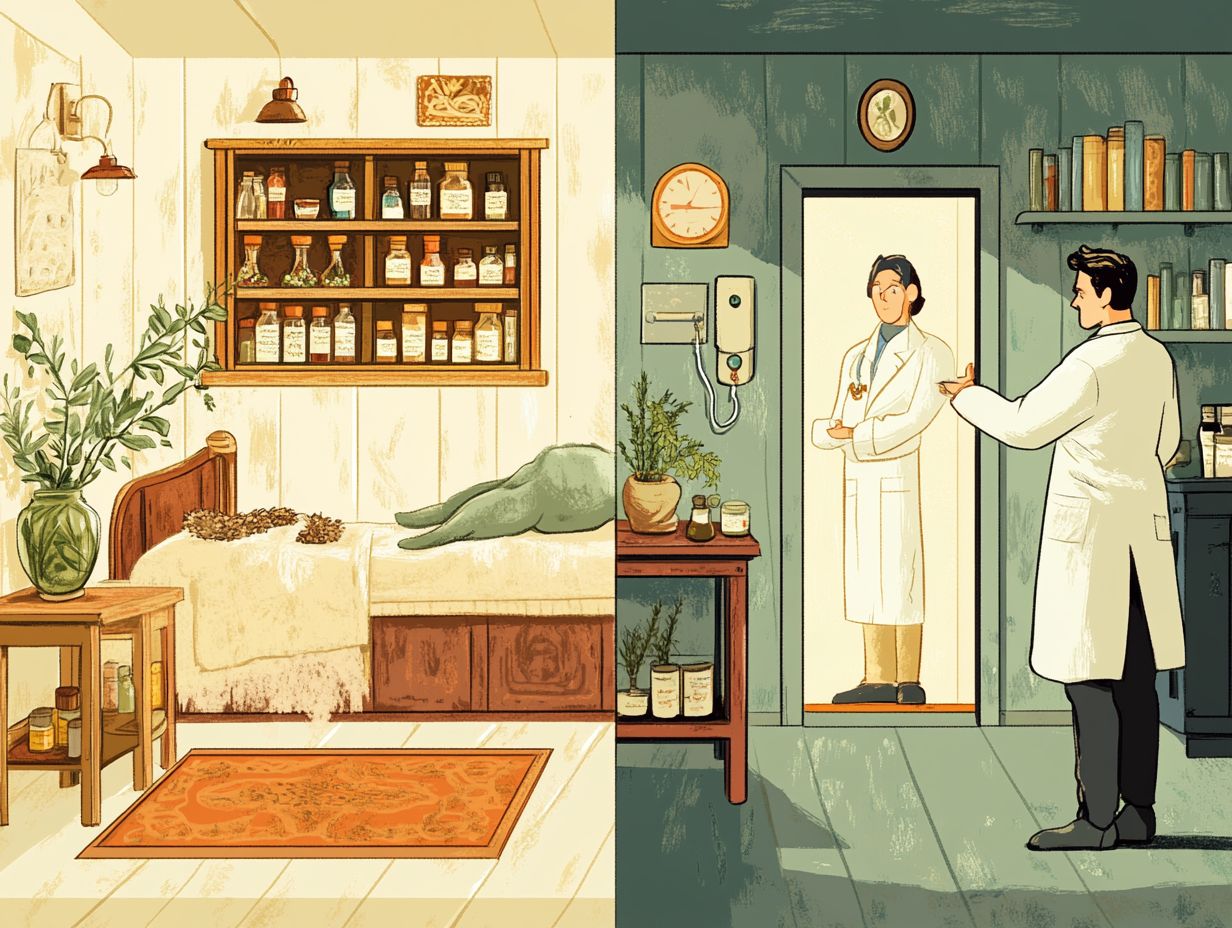How Does Alternative Medicine Differ from Conventional?
Alternative medicine presents a rich tapestry of healing practices that stand in stark contrast to conventional medical approaches.
With its emphasis on whole-person health, this field embraces a variety of modalities, each embodying unique philosophies and treatment methods. This content defines alternative medicine and its foundational principles while comparing it to conventional treatments. You ll delve into the diverse types available and uncover the benefits they can offer.
It also addresses the criticisms and controversies that often cloud these practices, ensuring you gain a well-rounded understanding of this fascinating realm of healthcare.
Contents
- Key Takeaways:
- Understanding Alternative Medicine
- Comparison to Conventional Medicine
- Types of Alternative Therapies
- Benefits of Alternative Medicine
- Criticism and Controversy Surrounding Alternative Medicine
- Frequently Asked Questions
- What is the main difference between alternative medicine and conventional medicine?
- How do alternative and conventional medicine differ in terms of their principles?
- What types of treatments are considered alternative medicine?
- Is alternative medicine scientifically proven?
- How does the cost of alternative medicine compare to conventional medicine?
- Can alternative medicine be used alongside conventional medicine?
Key Takeaways:

Alternative medicine focuses on a whole-person approach to healing, considering the mind, body, and spirit. It differs from conventional medicine in its principles and treatment methods. Various types of alternative medicine exist, each with its own set of modalities and techniques, including:
- Acupuncture
- Herbal medicine
- Meditation
- Yoga
- Chiropractic care
- Massage therapy
Alternative medicine has been shown to positively impact overall health, reducing stress and improving mental health. However, it also faces criticism over its safety and effectiveness.
Understanding Alternative Medicine
Understanding alternative medicine, often called complementary medicine or treatments that work alongside traditional medicine, invites you to explore a range of non-mainstream practices that coexist with traditional Western medicine.
These approaches aim to address a variety of conditions, including chronic pain, depression, anxiety, and lower back pain.
By embracing these diverse modalities, you can seek whole-person health solutions tailored to your unique needs and preferences.
Definition and Principles
The term “alternative medicine” encompasses a broad spectrum of practices that emphasize a whole-person approach to health and integrative medicine aimed at treating the whole person rather than isolated symptoms.
This perspective places importance on the interconnectedness of mind, body, and spirit, acknowledging that physical ailments often have roots in emotional or environmental factors. By fostering a deeper understanding of your unique experiences, alternative medicine promotes patient-centered care, enabling you to take an active role in your healing journey.
Techniques such as acupuncture, yoga, and meditation work to restore balance and enhance overall well-being.
By integrating these methods into your life, you ll gain improved mental clarity, reduced stress, and greater emotional resilience, ultimately elevating your quality of life as you explore alternative pathways to health.
Comparison to Conventional Medicine
The comparison between alternative medicine and conventional medicine reveals notable differences in approach, philosophy, and treatment methods. While traditional Western medicine typically emphasizes pharmacological interventions and surgical procedures, alternative medicine focuses on whole-person treatments.
This includes practices such as acupuncture, chiropractic care, and various complementary and alternative medicine (CAM) modalities.
Differences in Approach and Treatment

The differences in approach and treatment between alternative medicine and conventional medicine are striking. They are rooted in distinct philosophies and methodologies.
Alternative medicine emphasizes patient-centered care and holistic well-being, focusing on the individual as a whole. In contrast, conventional medicine leans heavily on evidence-based practices and standardized protocols to manage various conditions.
For instance, if you re grappling with chronic pain, acupuncture might be an option in alternative settings. It provides a natural way to relieve discomfort and enhance overall health without resorting to pharmaceuticals.
On the flip side, conventional methods often favor prescription medications, which can be effective in the short term but may bring potential side effects or dependency issues.
The differences in treatment philosophy spark a debate on the effectiveness and safety of various healthcare systems. Each offers unique advantages tailored to your preferences and needs.
Types of Alternative Therapies
Alternative medicine presents a rich tapestry of practices, including acupuncture, yoga, chiropractic care, meditation, and massage therapy.
Each of these practices offers distinct pathways to enhance your health and well-being, inviting you to explore various approaches tailored to your individual needs.
Overview of Different Practices
Exploring the diverse practices in alternative medicine unveils a rich tapestry of methods, each with its own philosophy and methodology. Whether it s acupuncture, chiropractic care, yoga, or meditation, each approach draws from various cultural backgrounds and historical traditions.
Take acupuncture, for instance. This ancient Chinese practice involves delicately inserting thin needles into specific points on the body to help reduce problems like chronic pain and stress.
On the other hand, chiropractic care focuses on spinal alignment and nervous system function. It aims to treat musculoskeletal disorders and alleviate back pain while enhancing overall mobility.
Then there’s yoga, which weaves together physical postures, breathing techniques, and mindfulness to foster mental clarity and physical flexibility. Let s not overlook meditation, a cornerstone practice that promotes relaxation and mental well-being, effectively tackling anxiety and depression through its soothing techniques.
Each of these practices offers a unique perspective on health, enriching the ongoing conversation around wellness and inviting you to explore new pathways to holistic well-being.
Benefits of Alternative Medicine
Discover the many benefits of alternative medicine! It offers a variety of therapies that effectively manage chronic pain, anxiety, and more.
These approaches not only address specific ailments but also promote a holistic sense of well-being, enhancing your overall health in profound ways.
Positive Impacts on Health and Well-being

The positive impacts on your health and well-being from alternative medicine are striking. It can facilitate pain management, reduce stress, and enhance overall wellness.
Numerous studies indicate that therapies like acupuncture and herbal treatments can significantly relieve chronic pain and anxiety. For instance, recent research revealed that patients who integrated these therapies with conventional treatments experienced a remarkable 30% reduction in pain levels and reported a greater sense of tranquility.
Testimonials from individuals showcase how practices such as yoga and mindfulness have enabled them to reclaim control over their mental health. This has led to improved daily functioning.
The holistic approach of alternative medicine not only targets the absence of illness but also fosters a balanced state of physical, emotional, and spiritual well-being. This makes it a valuable complement to traditional healthcare strategies.
Criticism and Controversy Surrounding Alternative Medicine
Criticism and controversy surrounding alternative medicine frequently arise from skepticism regarding its efficacy, especially in comparison to evidence-based medicine.
While some practitioners advocate for its benefits, others urge caution. It s essential to research thoroughly and consider both sides of the debate before making healthcare decisions.
Concerns and Debates
Concerns about alternative medicine often focus on its safety and effectiveness. Many wonder if these therapies can provide relief without risking health.
While some methods show promise, it s crucial to tell the difference between personal stories and scientifically proven treatments. Misunderstandings about alternative medicine often lead to confusion regarding its role alongside traditional healthcare.
There is a strong push for evidence-based approaches. Rigorous studies are essential to evaluate both the benefits and risks so you can make informed health decisions.
Frequently Asked Questions
What is the main difference between alternative medicine and conventional medicine?

The main difference between alternative medicine and conventional medicine lies in their treatment approaches. Alternative medicine focuses on natural methods, working with the whole person, including their physical and emotional health, while conventional medicine relies on modern treatments and pharmaceuticals.
How do alternative and conventional medicine differ in terms of their principles?
Alternative medicine is based on the belief that the body can heal itself, emphasizing treating the root cause of an illness. Conventional medicine, on the other hand, focuses on managing symptoms using technology and medication to cure diseases.
What types of treatments are considered alternative medicine?
Alternative medicine includes a wide range of treatments such as acupuncture, herbal medicine, chiropractic care, homeopathy, and massage therapy. These methods are often used together for a more comprehensive approach.
Is alternative medicine scientifically proven?
While some alternative medicine practices have scientific backing, many do not. It s important to research thoroughly and consult a healthcare professional before trying any alternative treatments.
How does the cost of alternative medicine compare to conventional medicine?
Alternative medicine treatments can vary in cost, but they are generally less expensive than conventional medical treatments. They often use natural and non-invasive methods that do not require expensive technology or medications.
Can alternative medicine be used alongside conventional medicine?
Yes! Alternative medicine can work alongside conventional medicine. Many healthcare professionals now recommend a combination of both approaches for a more personalized treatment plan.






